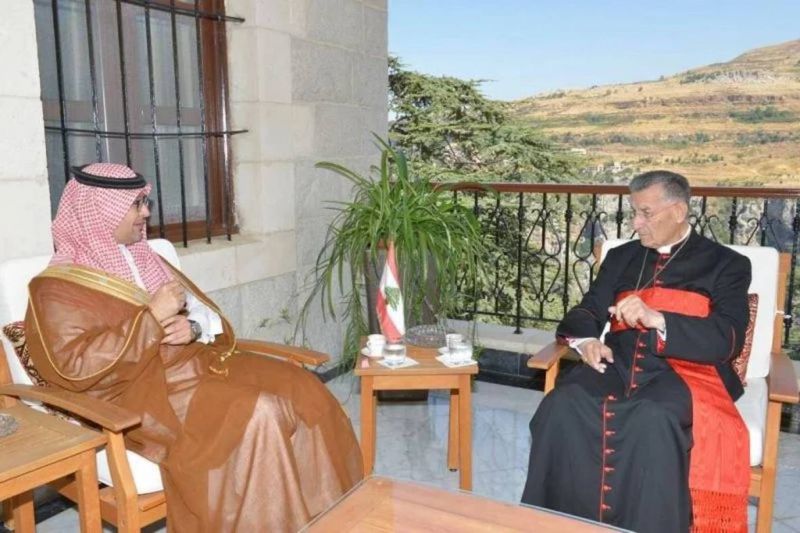
Maronite Patriarch Bechara Rai receiving the Saudi ambassador to Beirut, Walid Boukhari, in Diman, Monday. (Credit: Saudi embassy Twitter (X))
“Excuse me, your holiness, but I don’t get it.”
Maronite Patriarch Bechara al-Rai’s Sunday sermon, expressing openness to Speaker Nabih Berri’s initiative, has caused consternation.
Berri had pledged to hold “open and successful electoral sessions,” provided that they were preceded by a week of dialogue.
This change in Bkirki’s stance, otherwise critical of any attempt to circumvent the democratic process, was denounced by opposition parties, especially the Christians. MP Ghayath Yazbeck, (Lebanese Forces/Batroun), saw the patriarch’s position as a U-turn.
Other opposition figures, like Progressive Socialist Party (PSP) leader Teymour Joumblatt, welcomed it.
‘Misunderstanding’
Since the beginning of the presidential vacuum, the patriarch, like most of the opposition camp, refused to elect a president after holding a round of negotiations, calling for all parties to abide by the democratic principles and the constitution.
However, when Berri appeared to take a step toward the opposition by promising to hold “open and successful electoral sessions” if they agreed to participate in a week-long dialogue, the prelate met him halfway.
“If the dialogue they are invited to takes place despite the tensions between acceptance and refusal, the MPs must participate without bias or a desire to impose their ideas, projects or points of view that exclude others,” Rai said during his Sunday sermon.
The anti-Hezbollah camp, however, has rejected Berri’s proposition outright. “It would be a dangerous precedent that would cement the marginalization of the constitutional process,” said MP Ghada Ayoub, (LF\Jezzine).
“We are being invited to a dialogue with the aim not of finding a middle ground but to convince us to support Sleiman Frangieh, Hezbollah’s candidate,” said Kataeb spokesperson Patrick Richa, who refused to comment on Bkirki’s position in this regard.
In response to these reactions, Bkirki got things perfectly clear. “In his sermon, a source close to Bkirki stated, “the patriarch insisted on respecting the constitution and recalled that it is the only way to elect a president as soon as possible.”
“Those who have criticized us have only focused on a part of the speech,” the source added, noting that the patriarch did not directly call for a positive response to Berri’s initiative, merely urged all parties to take advantage of it so as to break the deadlock, if they ever decide to come together at the same table.
The opposition seems willing to contain the dispute.
“The Maronite patriarch is particularly committed to the constitution,” Ayoub explained. “There may have been a misunderstanding at the beginning, but we’re past this now.”
After strongly criticizing the Hezbollah camp and its allies in a speech on Sunday, LF Leader Samir Geagea had a phone conversation with the patriarch on Tuesday to discuss the matter.
The patriarch also received the Saudi Ambassador to Beirut, Waleed Bukhari, in Diman. Coming the day after Rai’s sermon, this visit was seen by some observers as implicit support for the prelate’s position.
“The presidential issue was discussed, and we are in line with the Kingdom,” said the source close to Bkirki.
“Ambassador Bukhari expressed Saudi Arabia’s commitment to stability in Lebanon, respect for the Constitution and the Taif Agreement, as well as its opposition to any actor imposing conditions on the Lebanese,” said Church spokesperson, Walid Ghayad, following the meeting.
‘A vile act’
Rai’s openness earned praise from some segments of the opposition. “The Patriarch’s position is wise,” stated Teymour Joumblatt, which seems a subtle dig at Geagea, whose supporters affectionately call him “hakim” [“wise” or “doctor”].
The PSP had already distanced itself from the rest of the opposition regarding the French initiative. Its parliamentary bloc even answered the controversial questionnaire that French envoy Jean-Yves Le Drian distributed to various parties a few weeks ago, ahead of the national dialogue he aims to hold upon his return to Beirut in September.
“Realistically speaking, we believe dialogue is the only way forward,” said former minister and PSP member Ghazi Aridi. “Those who criticize us for this position did the same in 2016 when they elected Michel Aoun as president following negotiations and a compromise,” a reference to the LF and the Free Patriotic Movement’s Maarab Agreement.
“Saying that we are in favor of dialogue does not mean we are straying from our principles and political stance,” Aridi added. ”We continue to call for the election of a reformist figure that is not affiliated with any camp.”
The LF claims to “understand” the PSP’s position. “Each party has the right to have its own approach,” said Ayoub. “What’s important is that we agree on major issues.”
In response to some political parties’ rejection of Berri’s initiative, opposition MP Adib Abdelmassih, who is close to Michel Moawad’s Independence Movement, has proposed an alternative solution to break the impasse following a meeting with the patriarch last week.
He suggested holding open electoral sessions with bilateral dialogues in between. The lawmaker has initiated discussions with various political blocs and is scheduled to meet with Berri today.
This approach does not have unanimous support within the opposition. While the LF seems to like Abdelmassih’s idea for now, the Kataeb is much less enthusiastic.
“With all due respect,” Richa said, “it is not through a vile act that we will elect a president.”
This story first ran in French in L’Orient-Le Jour, translated by Joelle Khoury.